Business Law Assignment: Contract Formation, Terms, and Liability
VerifiedAdded on 2020/05/28
|15
|3169
|200
Homework Assignment
AI Summary
This business law assignment provides a detailed analysis of contract law principles, focusing on the formation of contracts, the essential elements required for a valid agreement (offer, acceptance, consideration, and intention to create legal relations), and the implications of exclusion clauses. The assignment examines a scenario involving a café and a customer, assessing whether a valid contract was formed and whether the café is liable for damages based on an exclusion clause. It explores relevant legal precedents, including AGC (Advances) Ltd v McWhirter, Hyde v Wrench, Carlill v Carbolic Smoke Ball, L'Estrange v Graucob, and Thornton v Shoe Lane Parking, along with the application of the Australian Consumer Law (ACL), particularly sections related to consumer guarantees, deceptive conduct, and limitations on exclusion clauses. The assignment concludes that a valid contract was formed and that the café is likely liable due to the ineffectiveness of the exclusion clause under the ACL.
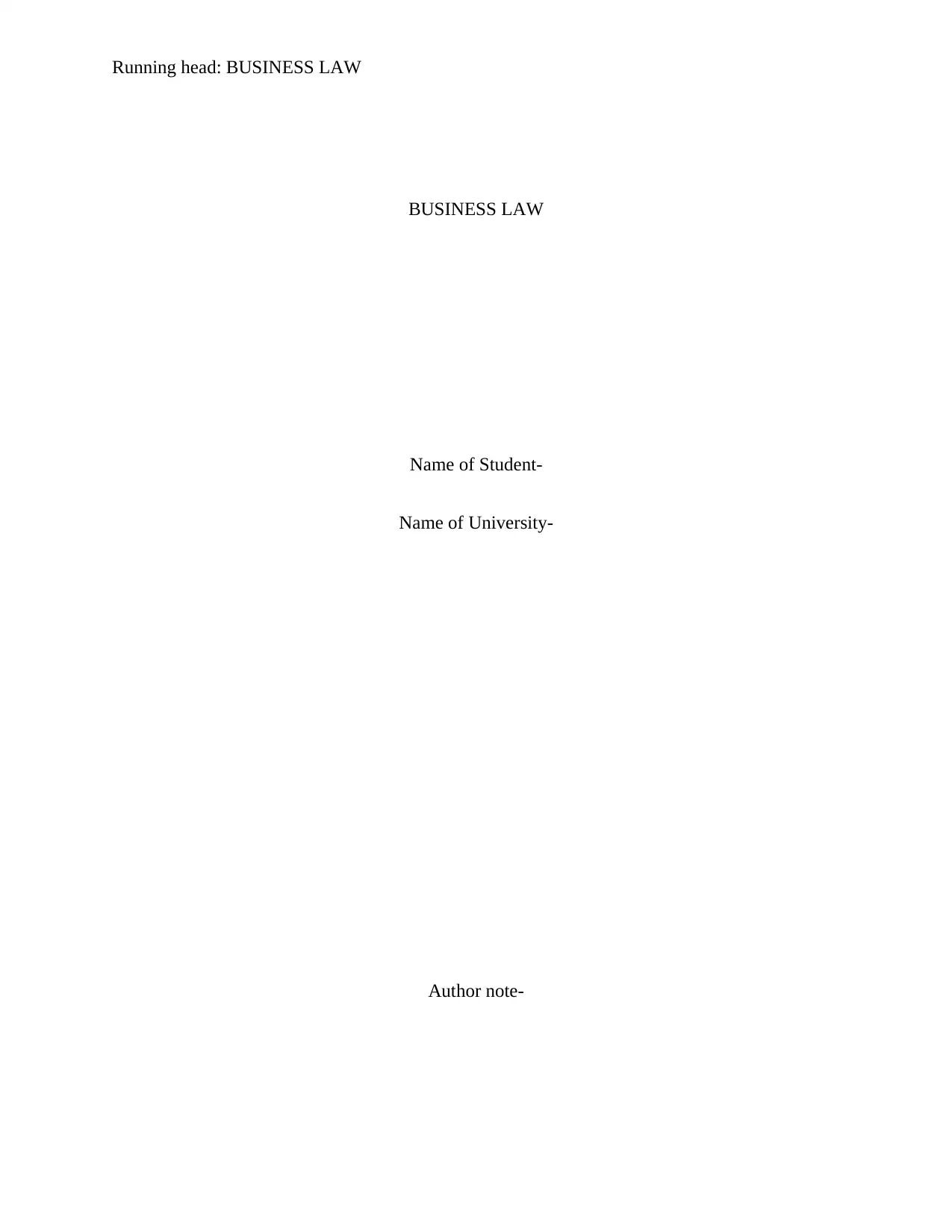
Running head: BUSINESS LAW
BUSINESS LAW
Name of Student-
Name of University-
Author note-
BUSINESS LAW
Name of Student-
Name of University-
Author note-
Paraphrase This Document
Need a fresh take? Get an instant paraphrase of this document with our AI Paraphraser
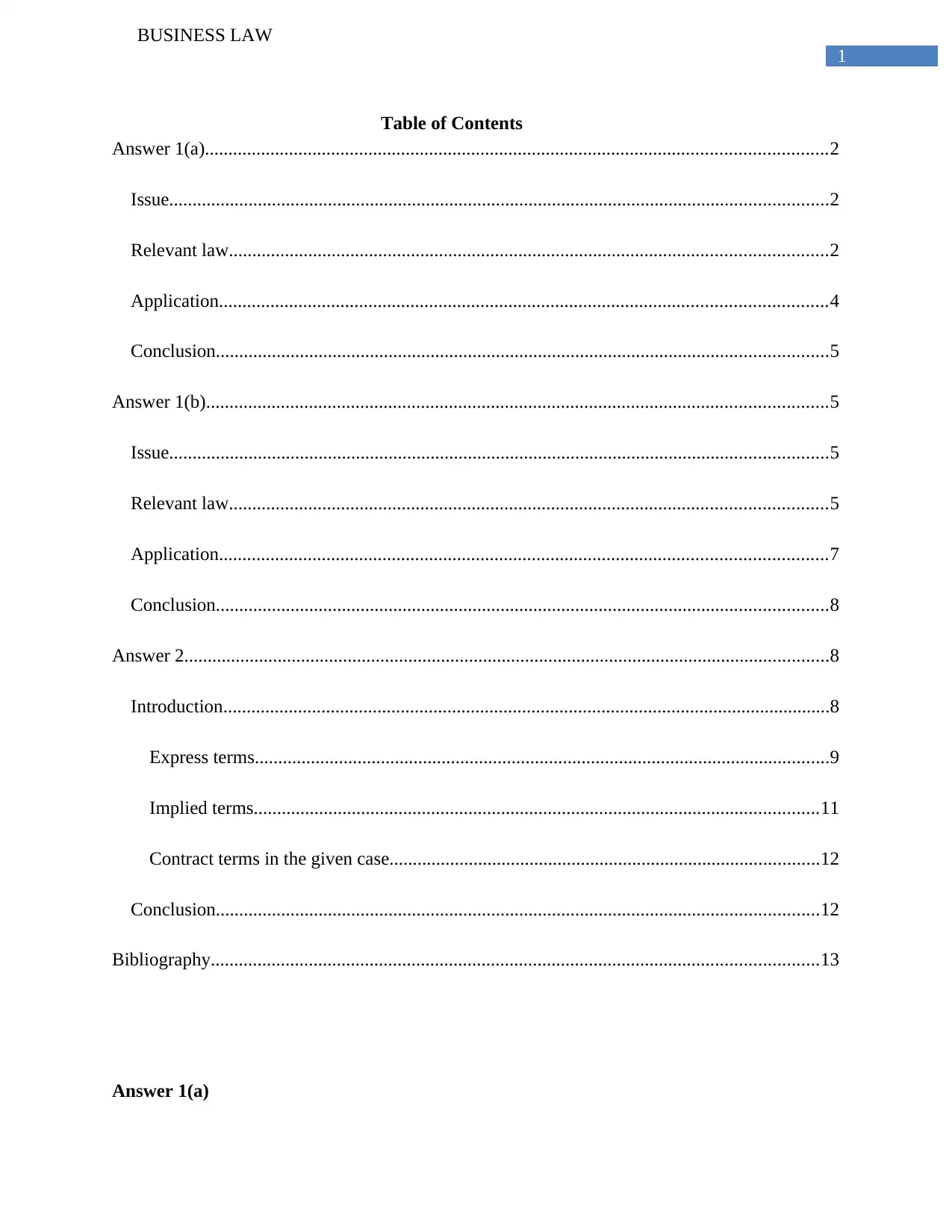
1
BUSINESS LAW
Table of Contents
Answer 1(a).....................................................................................................................................2
Issue.............................................................................................................................................2
Relevant law................................................................................................................................2
Application..................................................................................................................................4
Conclusion...................................................................................................................................5
Answer 1(b).....................................................................................................................................5
Issue.............................................................................................................................................5
Relevant law................................................................................................................................5
Application..................................................................................................................................7
Conclusion...................................................................................................................................8
Answer 2..........................................................................................................................................8
Introduction..................................................................................................................................8
Express terms...........................................................................................................................9
Implied terms.........................................................................................................................11
Contract terms in the given case............................................................................................12
Conclusion.................................................................................................................................12
Bibliography..................................................................................................................................13
Answer 1(a)
BUSINESS LAW
Table of Contents
Answer 1(a).....................................................................................................................................2
Issue.............................................................................................................................................2
Relevant law................................................................................................................................2
Application..................................................................................................................................4
Conclusion...................................................................................................................................5
Answer 1(b).....................................................................................................................................5
Issue.............................................................................................................................................5
Relevant law................................................................................................................................5
Application..................................................................................................................................7
Conclusion...................................................................................................................................8
Answer 2..........................................................................................................................................8
Introduction..................................................................................................................................8
Express terms...........................................................................................................................9
Implied terms.........................................................................................................................11
Contract terms in the given case............................................................................................12
Conclusion.................................................................................................................................12
Bibliography..................................................................................................................................13
Answer 1(a)
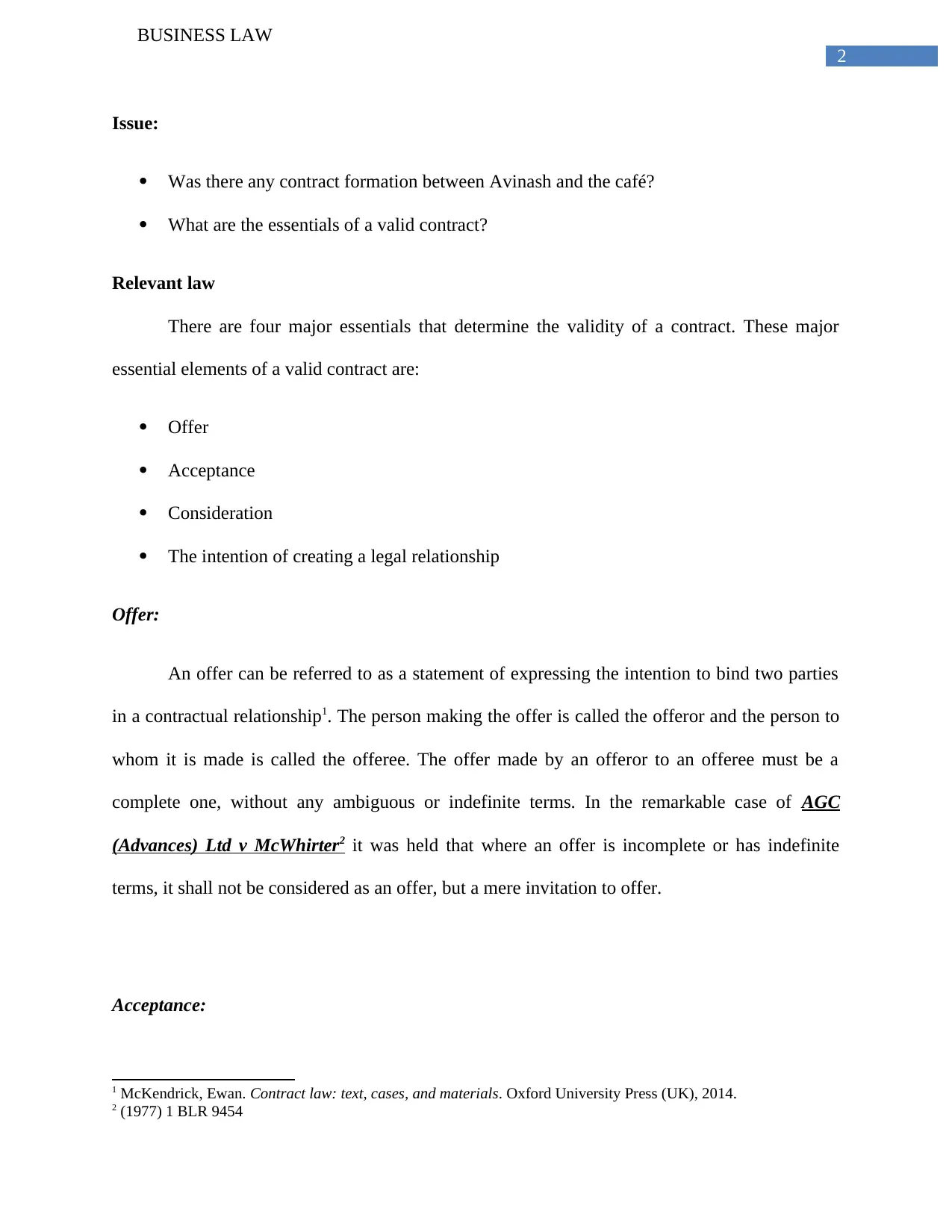
2
BUSINESS LAW
Issue:
Was there any contract formation between Avinash and the café?
What are the essentials of a valid contract?
Relevant law
There are four major essentials that determine the validity of a contract. These major
essential elements of a valid contract are:
Offer
Acceptance
Consideration
The intention of creating a legal relationship
Offer:
An offer can be referred to as a statement of expressing the intention to bind two parties
in a contractual relationship1. The person making the offer is called the offeror and the person to
whom it is made is called the offeree. The offer made by an offeror to an offeree must be a
complete one, without any ambiguous or indefinite terms. In the remarkable case of AGC
(Advances) Ltd v McWhirter2 it was held that where an offer is incomplete or has indefinite
terms, it shall not be considered as an offer, but a mere invitation to offer.
Acceptance:
1 McKendrick, Ewan. Contract law: text, cases, and materials. Oxford University Press (UK), 2014.
2 (1977) 1 BLR 9454
BUSINESS LAW
Issue:
Was there any contract formation between Avinash and the café?
What are the essentials of a valid contract?
Relevant law
There are four major essentials that determine the validity of a contract. These major
essential elements of a valid contract are:
Offer
Acceptance
Consideration
The intention of creating a legal relationship
Offer:
An offer can be referred to as a statement of expressing the intention to bind two parties
in a contractual relationship1. The person making the offer is called the offeror and the person to
whom it is made is called the offeree. The offer made by an offeror to an offeree must be a
complete one, without any ambiguous or indefinite terms. In the remarkable case of AGC
(Advances) Ltd v McWhirter2 it was held that where an offer is incomplete or has indefinite
terms, it shall not be considered as an offer, but a mere invitation to offer.
Acceptance:
1 McKendrick, Ewan. Contract law: text, cases, and materials. Oxford University Press (UK), 2014.
2 (1977) 1 BLR 9454
⊘ This is a preview!⊘
Do you want full access?
Subscribe today to unlock all pages.

Trusted by 1+ million students worldwide
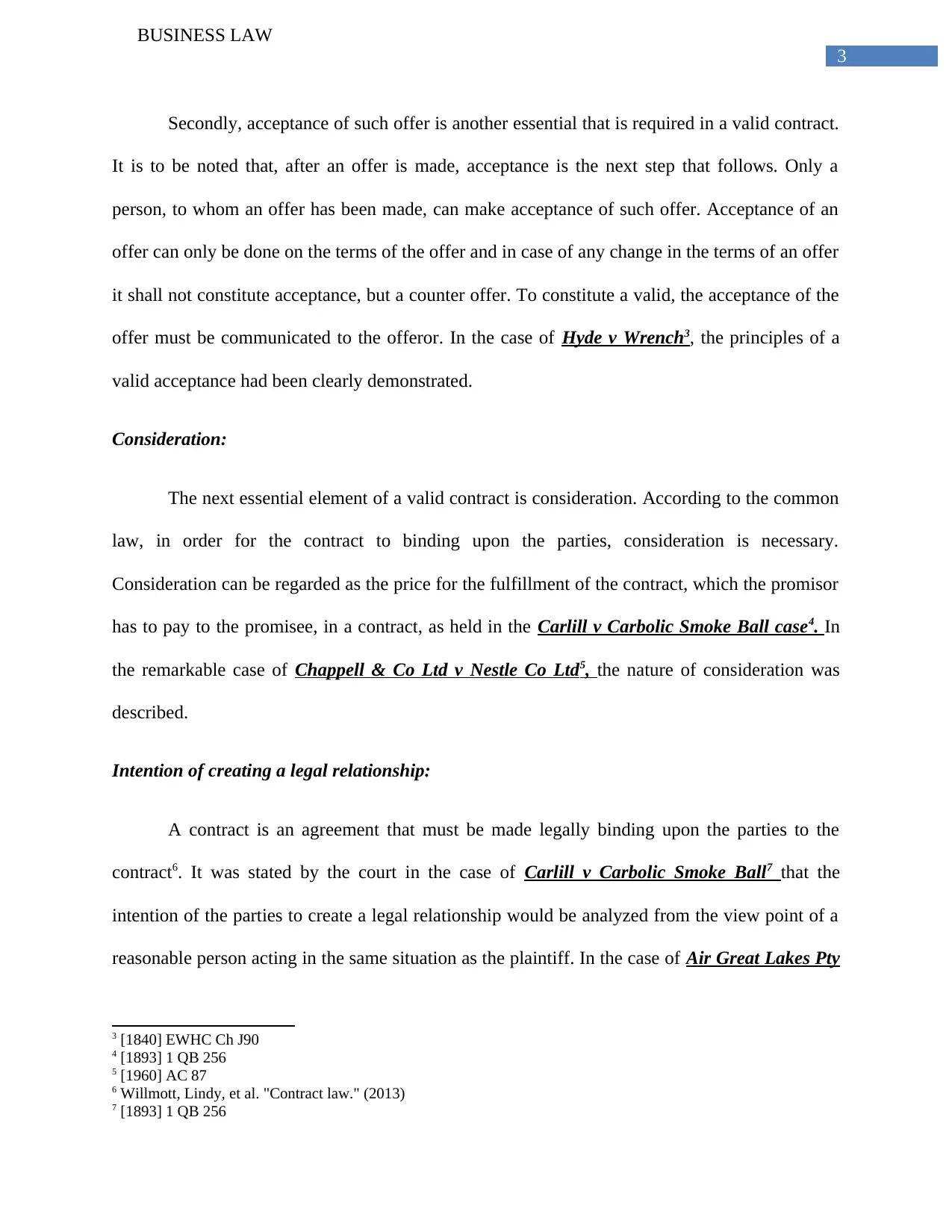
3
BUSINESS LAW
Secondly, acceptance of such offer is another essential that is required in a valid contract.
It is to be noted that, after an offer is made, acceptance is the next step that follows. Only a
person, to whom an offer has been made, can make acceptance of such offer. Acceptance of an
offer can only be done on the terms of the offer and in case of any change in the terms of an offer
it shall not constitute acceptance, but a counter offer. To constitute a valid, the acceptance of the
offer must be communicated to the offeror. In the case of Hyde v Wrench3, the principles of a
valid acceptance had been clearly demonstrated.
Consideration:
The next essential element of a valid contract is consideration. According to the common
law, in order for the contract to binding upon the parties, consideration is necessary.
Consideration can be regarded as the price for the fulfillment of the contract, which the promisor
has to pay to the promisee, in a contract, as held in the Carlill v Carbolic Smoke Ball case4. In
the remarkable case of Chappell & Co Ltd v Nestle Co Ltd5, the nature of consideration was
described.
Intention of creating a legal relationship:
A contract is an agreement that must be made legally binding upon the parties to the
contract6. It was stated by the court in the case of Carlill v Carbolic Smoke Ball7 that the
intention of the parties to create a legal relationship would be analyzed from the view point of a
reasonable person acting in the same situation as the plaintiff. In the case of Air Great Lakes Pty
3 [1840] EWHC Ch J90
4 [1893] 1 QB 256
5 [1960] AC 87
6 Willmott, Lindy, et al. "Contract law." (2013)
7 [1893] 1 QB 256
BUSINESS LAW
Secondly, acceptance of such offer is another essential that is required in a valid contract.
It is to be noted that, after an offer is made, acceptance is the next step that follows. Only a
person, to whom an offer has been made, can make acceptance of such offer. Acceptance of an
offer can only be done on the terms of the offer and in case of any change in the terms of an offer
it shall not constitute acceptance, but a counter offer. To constitute a valid, the acceptance of the
offer must be communicated to the offeror. In the case of Hyde v Wrench3, the principles of a
valid acceptance had been clearly demonstrated.
Consideration:
The next essential element of a valid contract is consideration. According to the common
law, in order for the contract to binding upon the parties, consideration is necessary.
Consideration can be regarded as the price for the fulfillment of the contract, which the promisor
has to pay to the promisee, in a contract, as held in the Carlill v Carbolic Smoke Ball case4. In
the remarkable case of Chappell & Co Ltd v Nestle Co Ltd5, the nature of consideration was
described.
Intention of creating a legal relationship:
A contract is an agreement that must be made legally binding upon the parties to the
contract6. It was stated by the court in the case of Carlill v Carbolic Smoke Ball7 that the
intention of the parties to create a legal relationship would be analyzed from the view point of a
reasonable person acting in the same situation as the plaintiff. In the case of Air Great Lakes Pty
3 [1840] EWHC Ch J90
4 [1893] 1 QB 256
5 [1960] AC 87
6 Willmott, Lindy, et al. "Contract law." (2013)
7 [1893] 1 QB 256
Paraphrase This Document
Need a fresh take? Get an instant paraphrase of this document with our AI Paraphraser
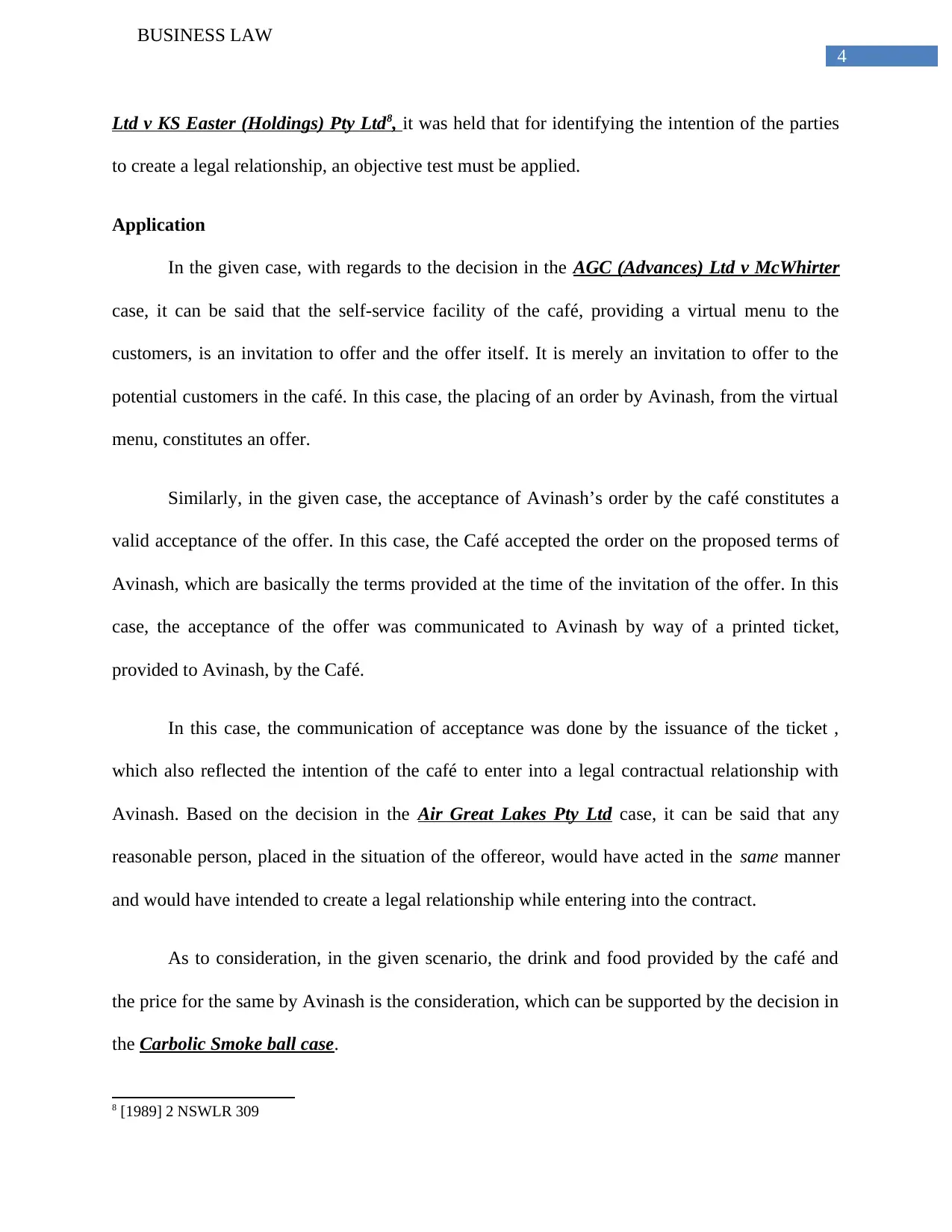
4
BUSINESS LAW
Ltd v KS Easter (Holdings) Pty Ltd8, it was held that for identifying the intention of the parties
to create a legal relationship, an objective test must be applied.
Application
In the given case, with regards to the decision in the AGC (Advances) Ltd v McWhirter
case, it can be said that the self-service facility of the café, providing a virtual menu to the
customers, is an invitation to offer and the offer itself. It is merely an invitation to offer to the
potential customers in the café. In this case, the placing of an order by Avinash, from the virtual
menu, constitutes an offer.
Similarly, in the given case, the acceptance of Avinash’s order by the café constitutes a
valid acceptance of the offer. In this case, the Café accepted the order on the proposed terms of
Avinash, which are basically the terms provided at the time of the invitation of the offer. In this
case, the acceptance of the offer was communicated to Avinash by way of a printed ticket,
provided to Avinash, by the Café.
In this case, the communication of acceptance was done by the issuance of the ticket ,
which also reflected the intention of the café to enter into a legal contractual relationship with
Avinash. Based on the decision in the Air Great Lakes Pty Ltd case, it can be said that any
reasonable person, placed in the situation of the offereor, would have acted in the same manner
and would have intended to create a legal relationship while entering into the contract.
As to consideration, in the given scenario, the drink and food provided by the café and
the price for the same by Avinash is the consideration, which can be supported by the decision in
the Carbolic Smoke ball case.
8 [1989] 2 NSWLR 309
BUSINESS LAW
Ltd v KS Easter (Holdings) Pty Ltd8, it was held that for identifying the intention of the parties
to create a legal relationship, an objective test must be applied.
Application
In the given case, with regards to the decision in the AGC (Advances) Ltd v McWhirter
case, it can be said that the self-service facility of the café, providing a virtual menu to the
customers, is an invitation to offer and the offer itself. It is merely an invitation to offer to the
potential customers in the café. In this case, the placing of an order by Avinash, from the virtual
menu, constitutes an offer.
Similarly, in the given case, the acceptance of Avinash’s order by the café constitutes a
valid acceptance of the offer. In this case, the Café accepted the order on the proposed terms of
Avinash, which are basically the terms provided at the time of the invitation of the offer. In this
case, the acceptance of the offer was communicated to Avinash by way of a printed ticket,
provided to Avinash, by the Café.
In this case, the communication of acceptance was done by the issuance of the ticket ,
which also reflected the intention of the café to enter into a legal contractual relationship with
Avinash. Based on the decision in the Air Great Lakes Pty Ltd case, it can be said that any
reasonable person, placed in the situation of the offereor, would have acted in the same manner
and would have intended to create a legal relationship while entering into the contract.
As to consideration, in the given scenario, the drink and food provided by the café and
the price for the same by Avinash is the consideration, which can be supported by the decision in
the Carbolic Smoke ball case.
8 [1989] 2 NSWLR 309
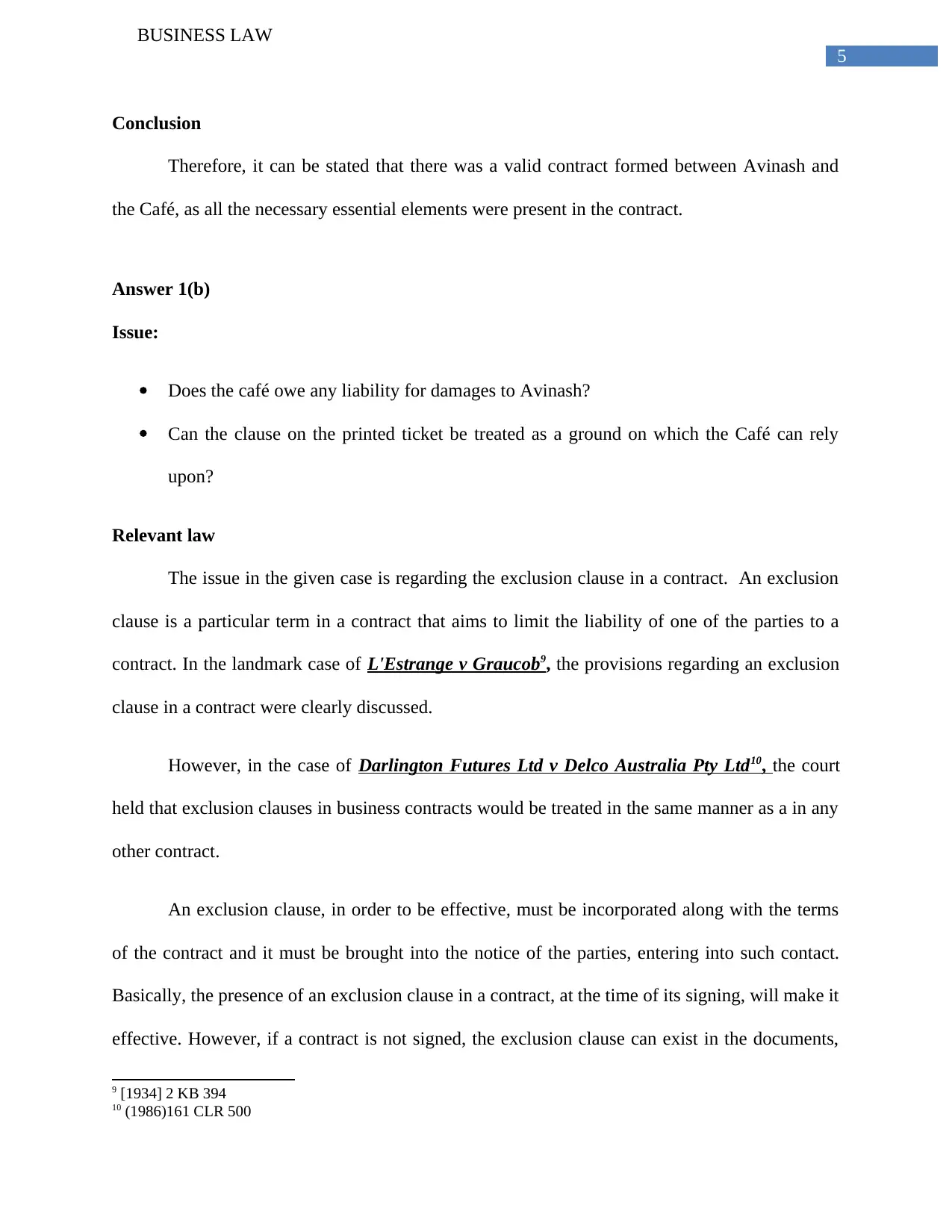
5
BUSINESS LAW
Conclusion
Therefore, it can be stated that there was a valid contract formed between Avinash and
the Café, as all the necessary essential elements were present in the contract.
Answer 1(b)
Issue:
Does the café owe any liability for damages to Avinash?
Can the clause on the printed ticket be treated as a ground on which the Café can rely
upon?
Relevant law
The issue in the given case is regarding the exclusion clause in a contract. An exclusion
clause is a particular term in a contract that aims to limit the liability of one of the parties to a
contract. In the landmark case of L'Estrange v Graucob9, the provisions regarding an exclusion
clause in a contract were clearly discussed.
However, in the case of Darlington Futures Ltd v Delco Australia Pty Ltd10, the court
held that exclusion clauses in business contracts would be treated in the same manner as a in any
other contract.
An exclusion clause, in order to be effective, must be incorporated along with the terms
of the contract and it must be brought into the notice of the parties, entering into such contact.
Basically, the presence of an exclusion clause in a contract, at the time of its signing, will make it
effective. However, if a contract is not signed, the exclusion clause can exist in the documents,
9 [1934] 2 KB 394
10 (1986)161 CLR 500
BUSINESS LAW
Conclusion
Therefore, it can be stated that there was a valid contract formed between Avinash and
the Café, as all the necessary essential elements were present in the contract.
Answer 1(b)
Issue:
Does the café owe any liability for damages to Avinash?
Can the clause on the printed ticket be treated as a ground on which the Café can rely
upon?
Relevant law
The issue in the given case is regarding the exclusion clause in a contract. An exclusion
clause is a particular term in a contract that aims to limit the liability of one of the parties to a
contract. In the landmark case of L'Estrange v Graucob9, the provisions regarding an exclusion
clause in a contract were clearly discussed.
However, in the case of Darlington Futures Ltd v Delco Australia Pty Ltd10, the court
held that exclusion clauses in business contracts would be treated in the same manner as a in any
other contract.
An exclusion clause, in order to be effective, must be incorporated along with the terms
of the contract and it must be brought into the notice of the parties, entering into such contact.
Basically, the presence of an exclusion clause in a contract, at the time of its signing, will make it
effective. However, if a contract is not signed, the exclusion clause can exist in the documents,
9 [1934] 2 KB 394
10 (1986)161 CLR 500
⊘ This is a preview!⊘
Do you want full access?
Subscribe today to unlock all pages.

Trusted by 1+ million students worldwide
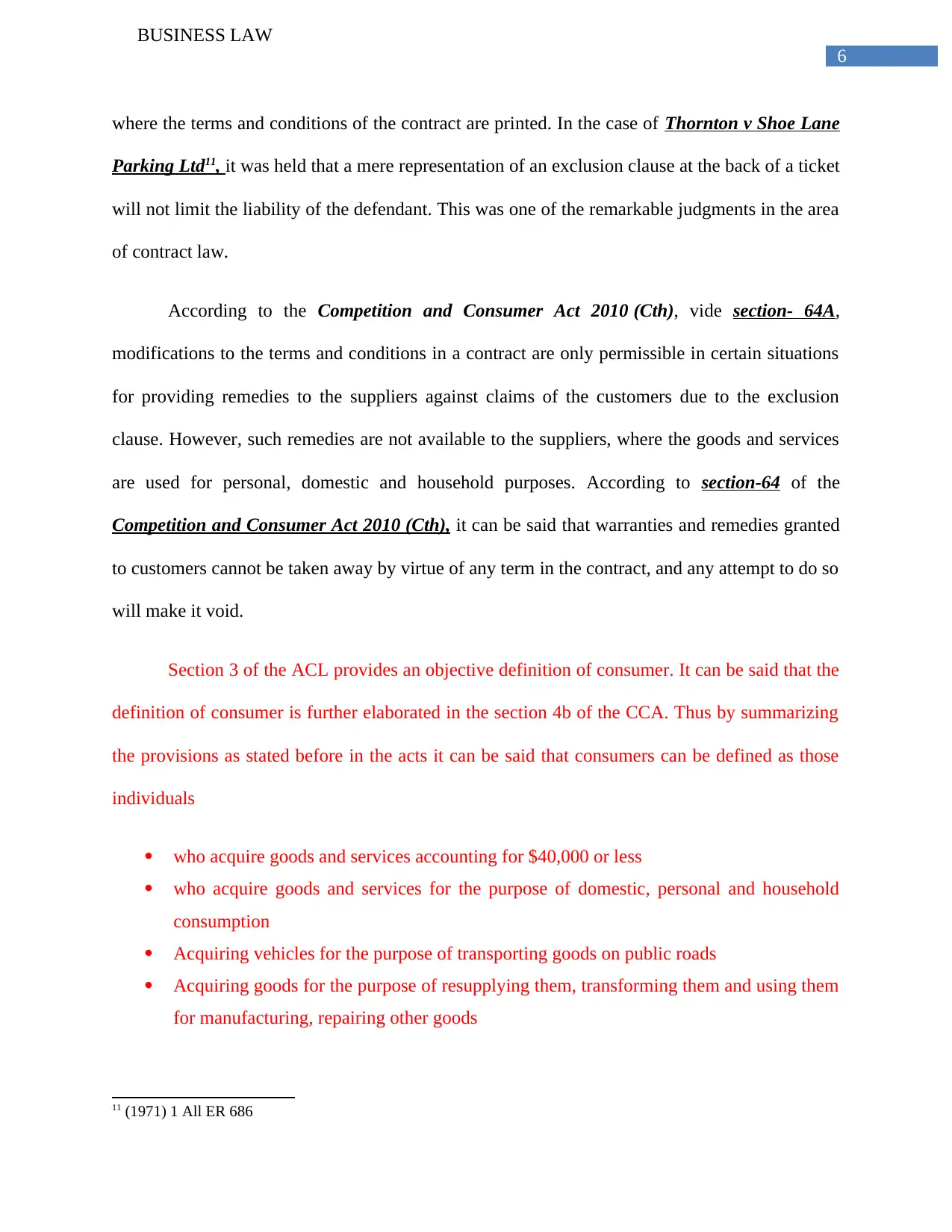
6
BUSINESS LAW
where the terms and conditions of the contract are printed. In the case of Thornton v Shoe Lane
Parking Ltd11, it was held that a mere representation of an exclusion clause at the back of a ticket
will not limit the liability of the defendant. This was one of the remarkable judgments in the area
of contract law.
According to the Competition and Consumer Act 2010 (Cth), vide section- 64A,
modifications to the terms and conditions in a contract are only permissible in certain situations
for providing remedies to the suppliers against claims of the customers due to the exclusion
clause. However, such remedies are not available to the suppliers, where the goods and services
are used for personal, domestic and household purposes. According to section-64 of the
Competition and Consumer Act 2010 (Cth), it can be said that warranties and remedies granted
to customers cannot be taken away by virtue of any term in the contract, and any attempt to do so
will make it void.
Section 3 of the ACL provides an objective definition of consumer. It can be said that the
definition of consumer is further elaborated in the section 4b of the CCA. Thus by summarizing
the provisions as stated before in the acts it can be said that consumers can be defined as those
individuals
who acquire goods and services accounting for $40,000 or less
who acquire goods and services for the purpose of domestic, personal and household
consumption
Acquiring vehicles for the purpose of transporting goods on public roads
Acquiring goods for the purpose of resupplying them, transforming them and using them
for manufacturing, repairing other goods
11 (1971) 1 All ER 686
BUSINESS LAW
where the terms and conditions of the contract are printed. In the case of Thornton v Shoe Lane
Parking Ltd11, it was held that a mere representation of an exclusion clause at the back of a ticket
will not limit the liability of the defendant. This was one of the remarkable judgments in the area
of contract law.
According to the Competition and Consumer Act 2010 (Cth), vide section- 64A,
modifications to the terms and conditions in a contract are only permissible in certain situations
for providing remedies to the suppliers against claims of the customers due to the exclusion
clause. However, such remedies are not available to the suppliers, where the goods and services
are used for personal, domestic and household purposes. According to section-64 of the
Competition and Consumer Act 2010 (Cth), it can be said that warranties and remedies granted
to customers cannot be taken away by virtue of any term in the contract, and any attempt to do so
will make it void.
Section 3 of the ACL provides an objective definition of consumer. It can be said that the
definition of consumer is further elaborated in the section 4b of the CCA. Thus by summarizing
the provisions as stated before in the acts it can be said that consumers can be defined as those
individuals
who acquire goods and services accounting for $40,000 or less
who acquire goods and services for the purpose of domestic, personal and household
consumption
Acquiring vehicles for the purpose of transporting goods on public roads
Acquiring goods for the purpose of resupplying them, transforming them and using them
for manufacturing, repairing other goods
11 (1971) 1 All ER 686
Paraphrase This Document
Need a fresh take? Get an instant paraphrase of this document with our AI Paraphraser
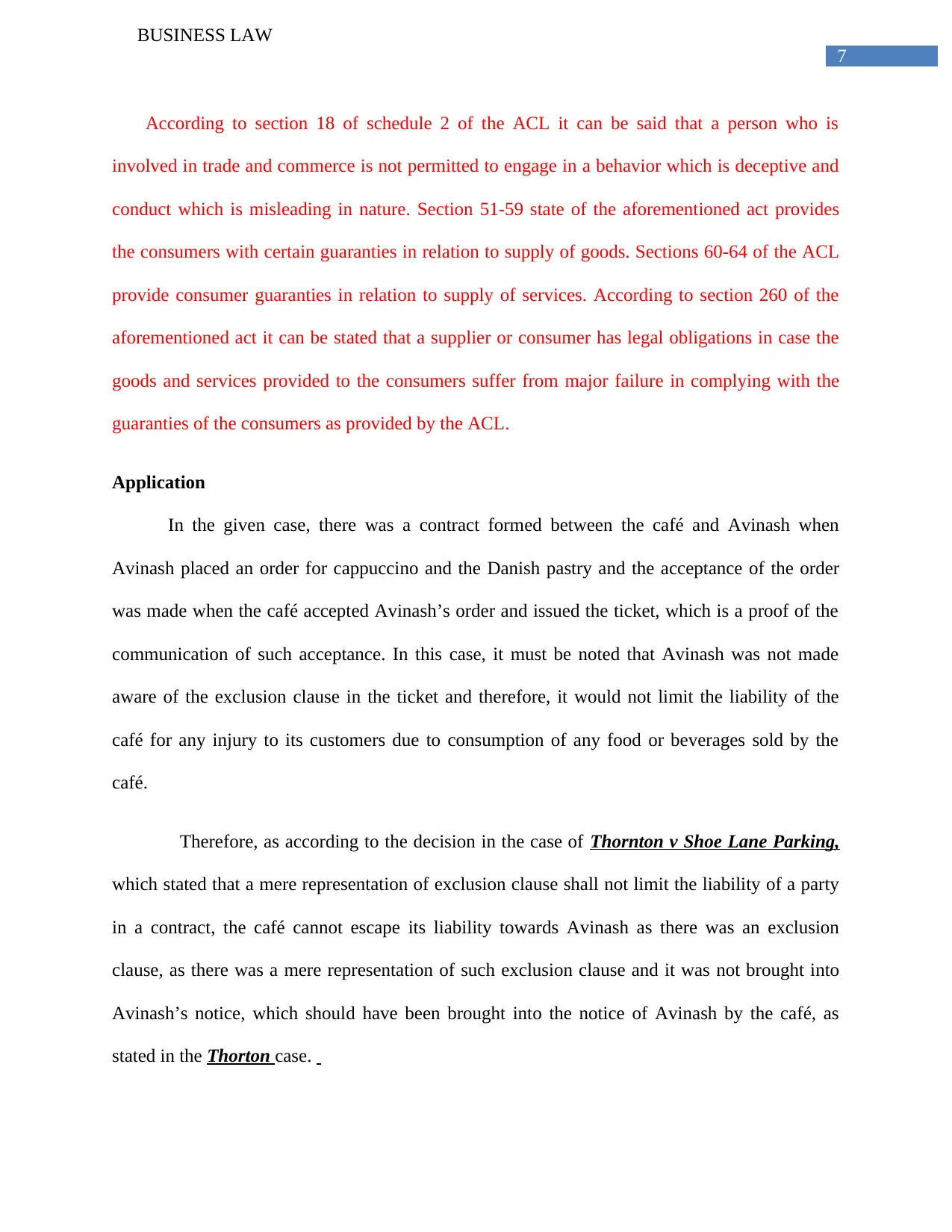
7
BUSINESS LAW
According to section 18 of schedule 2 of the ACL it can be said that a person who is
involved in trade and commerce is not permitted to engage in a behavior which is deceptive and
conduct which is misleading in nature. Section 51-59 state of the aforementioned act provides
the consumers with certain guaranties in relation to supply of goods. Sections 60-64 of the ACL
provide consumer guaranties in relation to supply of services. According to section 260 of the
aforementioned act it can be stated that a supplier or consumer has legal obligations in case the
goods and services provided to the consumers suffer from major failure in complying with the
guaranties of the consumers as provided by the ACL.
Application
In the given case, there was a contract formed between the café and Avinash when
Avinash placed an order for cappuccino and the Danish pastry and the acceptance of the order
was made when the café accepted Avinash’s order and issued the ticket, which is a proof of the
communication of such acceptance. In this case, it must be noted that Avinash was not made
aware of the exclusion clause in the ticket and therefore, it would not limit the liability of the
café for any injury to its customers due to consumption of any food or beverages sold by the
café.
Therefore, as according to the decision in the case of Thornton v Shoe Lane Parking,
which stated that a mere representation of exclusion clause shall not limit the liability of a party
in a contract, the café cannot escape its liability towards Avinash as there was an exclusion
clause, as there was a mere representation of such exclusion clause and it was not brought into
Avinash’s notice, which should have been brought into the notice of Avinash by the café, as
stated in the Thorton case.
BUSINESS LAW
According to section 18 of schedule 2 of the ACL it can be said that a person who is
involved in trade and commerce is not permitted to engage in a behavior which is deceptive and
conduct which is misleading in nature. Section 51-59 state of the aforementioned act provides
the consumers with certain guaranties in relation to supply of goods. Sections 60-64 of the ACL
provide consumer guaranties in relation to supply of services. According to section 260 of the
aforementioned act it can be stated that a supplier or consumer has legal obligations in case the
goods and services provided to the consumers suffer from major failure in complying with the
guaranties of the consumers as provided by the ACL.
Application
In the given case, there was a contract formed between the café and Avinash when
Avinash placed an order for cappuccino and the Danish pastry and the acceptance of the order
was made when the café accepted Avinash’s order and issued the ticket, which is a proof of the
communication of such acceptance. In this case, it must be noted that Avinash was not made
aware of the exclusion clause in the ticket and therefore, it would not limit the liability of the
café for any injury to its customers due to consumption of any food or beverages sold by the
café.
Therefore, as according to the decision in the case of Thornton v Shoe Lane Parking,
which stated that a mere representation of exclusion clause shall not limit the liability of a party
in a contract, the café cannot escape its liability towards Avinash as there was an exclusion
clause, as there was a mere representation of such exclusion clause and it was not brought into
Avinash’s notice, which should have been brought into the notice of Avinash by the café, as
stated in the Thorton case.
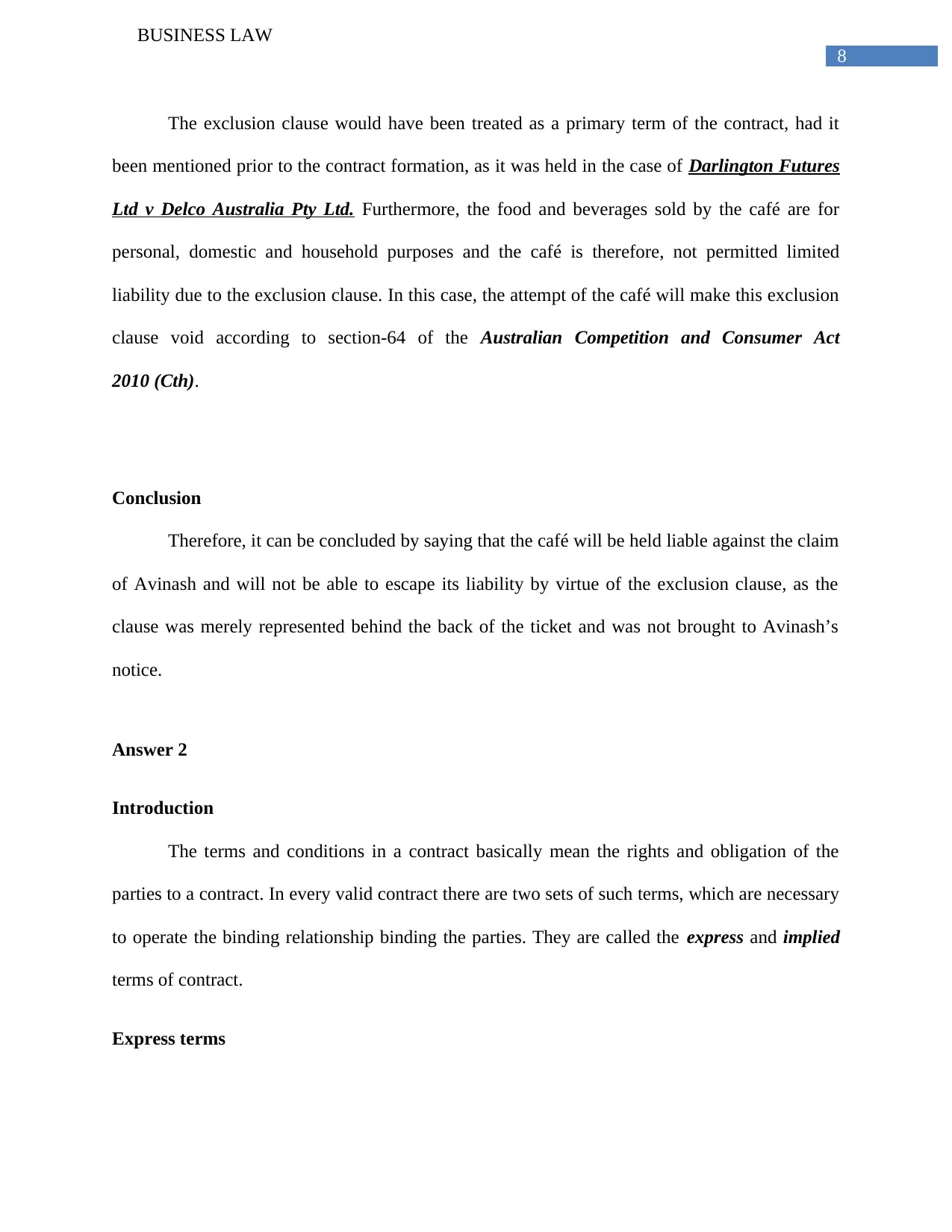
8
BUSINESS LAW
The exclusion clause would have been treated as a primary term of the contract, had it
been mentioned prior to the contract formation, as it was held in the case of Darlington Futures
Ltd v Delco Australia Pty Ltd. Furthermore, the food and beverages sold by the café are for
personal, domestic and household purposes and the café is therefore, not permitted limited
liability due to the exclusion clause. In this case, the attempt of the café will make this exclusion
clause void according to section-64 of the Australian Competition and Consumer Act
2010 (Cth).
Conclusion
Therefore, it can be concluded by saying that the café will be held liable against the claim
of Avinash and will not be able to escape its liability by virtue of the exclusion clause, as the
clause was merely represented behind the back of the ticket and was not brought to Avinash’s
notice.
Answer 2
Introduction
The terms and conditions in a contract basically mean the rights and obligation of the
parties to a contract. In every valid contract there are two sets of such terms, which are necessary
to operate the binding relationship binding the parties. They are called the express and implied
terms of contract.
Express terms
BUSINESS LAW
The exclusion clause would have been treated as a primary term of the contract, had it
been mentioned prior to the contract formation, as it was held in the case of Darlington Futures
Ltd v Delco Australia Pty Ltd. Furthermore, the food and beverages sold by the café are for
personal, domestic and household purposes and the café is therefore, not permitted limited
liability due to the exclusion clause. In this case, the attempt of the café will make this exclusion
clause void according to section-64 of the Australian Competition and Consumer Act
2010 (Cth).
Conclusion
Therefore, it can be concluded by saying that the café will be held liable against the claim
of Avinash and will not be able to escape its liability by virtue of the exclusion clause, as the
clause was merely represented behind the back of the ticket and was not brought to Avinash’s
notice.
Answer 2
Introduction
The terms and conditions in a contract basically mean the rights and obligation of the
parties to a contract. In every valid contract there are two sets of such terms, which are necessary
to operate the binding relationship binding the parties. They are called the express and implied
terms of contract.
Express terms
⊘ This is a preview!⊘
Do you want full access?
Subscribe today to unlock all pages.

Trusted by 1+ million students worldwide
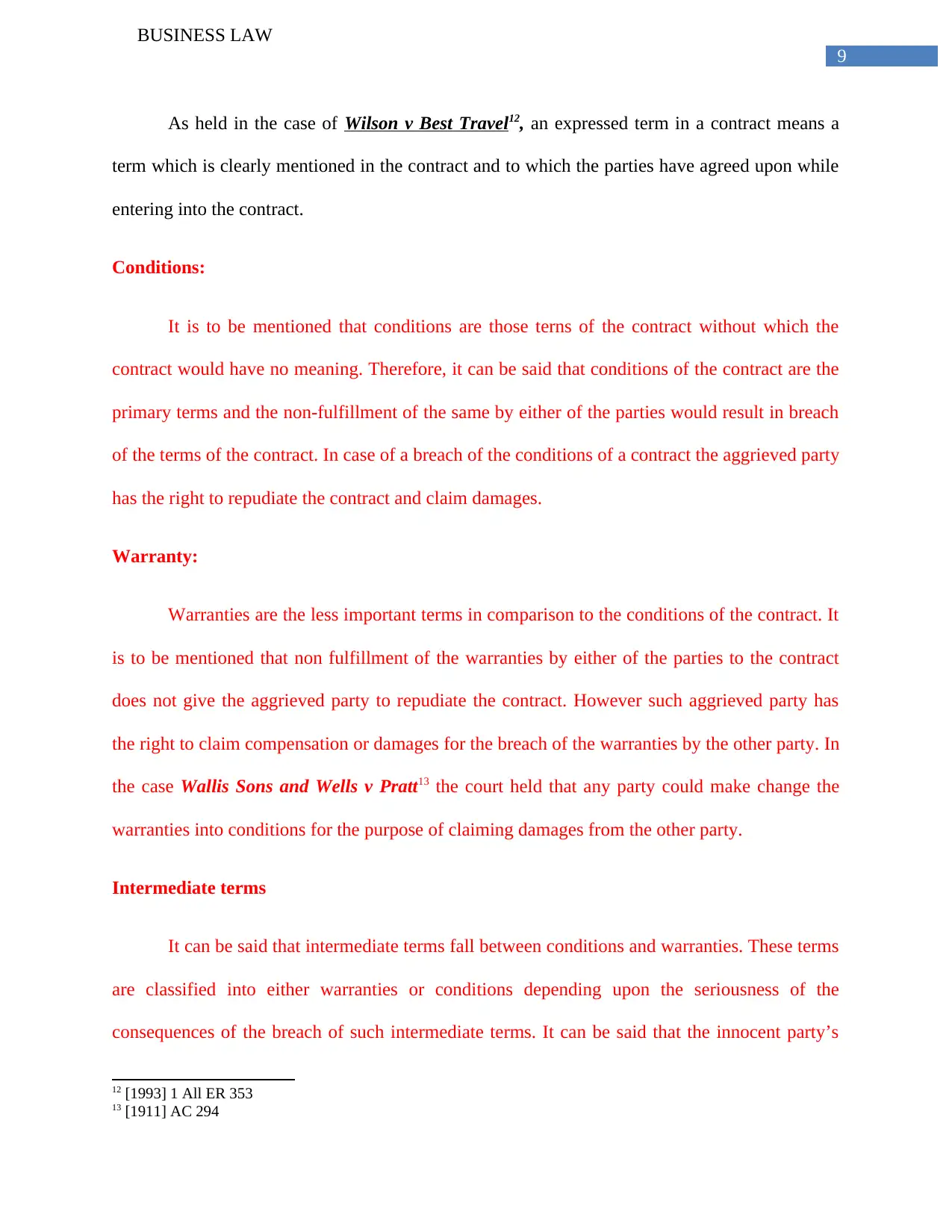
9
BUSINESS LAW
As held in the case of Wilson v Best Travel12, an expressed term in a contract means a
term which is clearly mentioned in the contract and to which the parties have agreed upon while
entering into the contract.
Conditions:
It is to be mentioned that conditions are those terns of the contract without which the
contract would have no meaning. Therefore, it can be said that conditions of the contract are the
primary terms and the non-fulfillment of the same by either of the parties would result in breach
of the terms of the contract. In case of a breach of the conditions of a contract the aggrieved party
has the right to repudiate the contract and claim damages.
Warranty:
Warranties are the less important terms in comparison to the conditions of the contract. It
is to be mentioned that non fulfillment of the warranties by either of the parties to the contract
does not give the aggrieved party to repudiate the contract. However such aggrieved party has
the right to claim compensation or damages for the breach of the warranties by the other party. In
the case Wallis Sons and Wells v Pratt13 the court held that any party could make change the
warranties into conditions for the purpose of claiming damages from the other party.
Intermediate terms
It can be said that intermediate terms fall between conditions and warranties. These terms
are classified into either warranties or conditions depending upon the seriousness of the
consequences of the breach of such intermediate terms. It can be said that the innocent party’s
12 [1993] 1 All ER 353
13 [1911] AC 294
BUSINESS LAW
As held in the case of Wilson v Best Travel12, an expressed term in a contract means a
term which is clearly mentioned in the contract and to which the parties have agreed upon while
entering into the contract.
Conditions:
It is to be mentioned that conditions are those terns of the contract without which the
contract would have no meaning. Therefore, it can be said that conditions of the contract are the
primary terms and the non-fulfillment of the same by either of the parties would result in breach
of the terms of the contract. In case of a breach of the conditions of a contract the aggrieved party
has the right to repudiate the contract and claim damages.
Warranty:
Warranties are the less important terms in comparison to the conditions of the contract. It
is to be mentioned that non fulfillment of the warranties by either of the parties to the contract
does not give the aggrieved party to repudiate the contract. However such aggrieved party has
the right to claim compensation or damages for the breach of the warranties by the other party. In
the case Wallis Sons and Wells v Pratt13 the court held that any party could make change the
warranties into conditions for the purpose of claiming damages from the other party.
Intermediate terms
It can be said that intermediate terms fall between conditions and warranties. These terms
are classified into either warranties or conditions depending upon the seriousness of the
consequences of the breach of such intermediate terms. It can be said that the innocent party’s
12 [1993] 1 All ER 353
13 [1911] AC 294
Paraphrase This Document
Need a fresh take? Get an instant paraphrase of this document with our AI Paraphraser
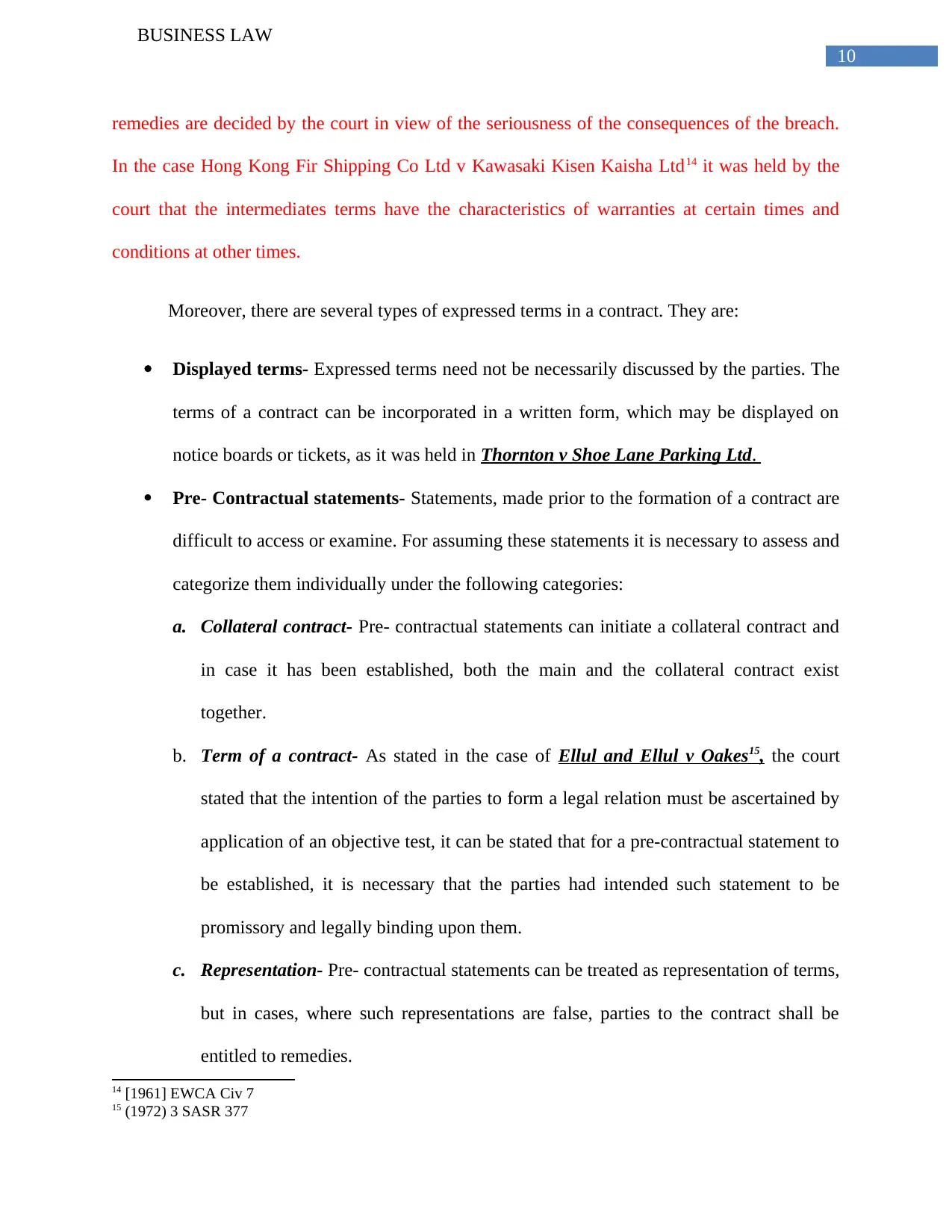
10
BUSINESS LAW
remedies are decided by the court in view of the seriousness of the consequences of the breach.
In the case Hong Kong Fir Shipping Co Ltd v Kawasaki Kisen Kaisha Ltd14 it was held by the
court that the intermediates terms have the characteristics of warranties at certain times and
conditions at other times.
Moreover, there are several types of expressed terms in a contract. They are:
Displayed terms- Expressed terms need not be necessarily discussed by the parties. The
terms of a contract can be incorporated in a written form, which may be displayed on
notice boards or tickets, as it was held in Thornton v Shoe Lane Parking Ltd.
Pre- Contractual statements- Statements, made prior to the formation of a contract are
difficult to access or examine. For assuming these statements it is necessary to assess and
categorize them individually under the following categories:
a. Collateral contract- Pre- contractual statements can initiate a collateral contract and
in case it has been established, both the main and the collateral contract exist
together.
b. Term of a contract- As stated in the case of Ellul and Ellul v Oakes15, the court
stated that the intention of the parties to form a legal relation must be ascertained by
application of an objective test, it can be stated that for a pre-contractual statement to
be established, it is necessary that the parties had intended such statement to be
promissory and legally binding upon them.
c. Representation- Pre- contractual statements can be treated as representation of terms,
but in cases, where such representations are false, parties to the contract shall be
entitled to remedies.
14 [1961] EWCA Civ 7
15 (1972) 3 SASR 377
BUSINESS LAW
remedies are decided by the court in view of the seriousness of the consequences of the breach.
In the case Hong Kong Fir Shipping Co Ltd v Kawasaki Kisen Kaisha Ltd14 it was held by the
court that the intermediates terms have the characteristics of warranties at certain times and
conditions at other times.
Moreover, there are several types of expressed terms in a contract. They are:
Displayed terms- Expressed terms need not be necessarily discussed by the parties. The
terms of a contract can be incorporated in a written form, which may be displayed on
notice boards or tickets, as it was held in Thornton v Shoe Lane Parking Ltd.
Pre- Contractual statements- Statements, made prior to the formation of a contract are
difficult to access or examine. For assuming these statements it is necessary to assess and
categorize them individually under the following categories:
a. Collateral contract- Pre- contractual statements can initiate a collateral contract and
in case it has been established, both the main and the collateral contract exist
together.
b. Term of a contract- As stated in the case of Ellul and Ellul v Oakes15, the court
stated that the intention of the parties to form a legal relation must be ascertained by
application of an objective test, it can be stated that for a pre-contractual statement to
be established, it is necessary that the parties had intended such statement to be
promissory and legally binding upon them.
c. Representation- Pre- contractual statements can be treated as representation of terms,
but in cases, where such representations are false, parties to the contract shall be
entitled to remedies.
14 [1961] EWCA Civ 7
15 (1972) 3 SASR 377
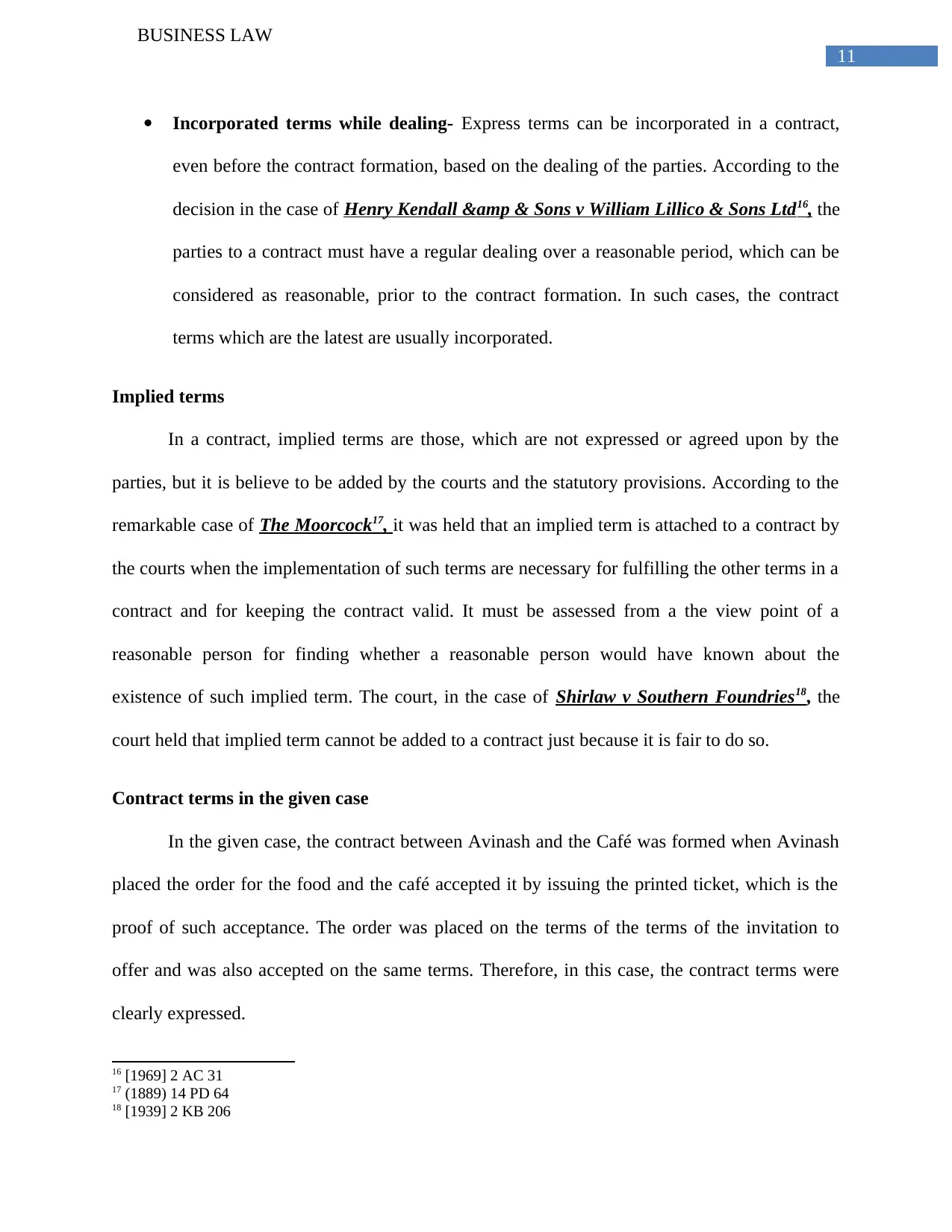
11
BUSINESS LAW
Incorporated terms while dealing- Express terms can be incorporated in a contract,
even before the contract formation, based on the dealing of the parties. According to the
decision in the case of Henry Kendall & & Sons v William Lillico & Sons Ltd16, the
parties to a contract must have a regular dealing over a reasonable period, which can be
considered as reasonable, prior to the contract formation. In such cases, the contract
terms which are the latest are usually incorporated.
Implied terms
In a contract, implied terms are those, which are not expressed or agreed upon by the
parties, but it is believe to be added by the courts and the statutory provisions. According to the
remarkable case of The Moorcock17, it was held that an implied term is attached to a contract by
the courts when the implementation of such terms are necessary for fulfilling the other terms in a
contract and for keeping the contract valid. It must be assessed from a the view point of a
reasonable person for finding whether a reasonable person would have known about the
existence of such implied term. The court, in the case of Shirlaw v Southern Foundries18, the
court held that implied term cannot be added to a contract just because it is fair to do so.
Contract terms in the given case
In the given case, the contract between Avinash and the Café was formed when Avinash
placed the order for the food and the café accepted it by issuing the printed ticket, which is the
proof of such acceptance. The order was placed on the terms of the terms of the invitation to
offer and was also accepted on the same terms. Therefore, in this case, the contract terms were
clearly expressed.
16 [1969] 2 AC 31
17 (1889) 14 PD 64
18 [1939] 2 KB 206
BUSINESS LAW
Incorporated terms while dealing- Express terms can be incorporated in a contract,
even before the contract formation, based on the dealing of the parties. According to the
decision in the case of Henry Kendall & & Sons v William Lillico & Sons Ltd16, the
parties to a contract must have a regular dealing over a reasonable period, which can be
considered as reasonable, prior to the contract formation. In such cases, the contract
terms which are the latest are usually incorporated.
Implied terms
In a contract, implied terms are those, which are not expressed or agreed upon by the
parties, but it is believe to be added by the courts and the statutory provisions. According to the
remarkable case of The Moorcock17, it was held that an implied term is attached to a contract by
the courts when the implementation of such terms are necessary for fulfilling the other terms in a
contract and for keeping the contract valid. It must be assessed from a the view point of a
reasonable person for finding whether a reasonable person would have known about the
existence of such implied term. The court, in the case of Shirlaw v Southern Foundries18, the
court held that implied term cannot be added to a contract just because it is fair to do so.
Contract terms in the given case
In the given case, the contract between Avinash and the Café was formed when Avinash
placed the order for the food and the café accepted it by issuing the printed ticket, which is the
proof of such acceptance. The order was placed on the terms of the terms of the invitation to
offer and was also accepted on the same terms. Therefore, in this case, the contract terms were
clearly expressed.
16 [1969] 2 AC 31
17 (1889) 14 PD 64
18 [1939] 2 KB 206
⊘ This is a preview!⊘
Do you want full access?
Subscribe today to unlock all pages.

Trusted by 1+ million students worldwide
1 out of 15
Related Documents
Your All-in-One AI-Powered Toolkit for Academic Success.
+13062052269
info@desklib.com
Available 24*7 on WhatsApp / Email
![[object Object]](/_next/static/media/star-bottom.7253800d.svg)
Unlock your academic potential
Copyright © 2020–2026 A2Z Services. All Rights Reserved. Developed and managed by ZUCOL.




